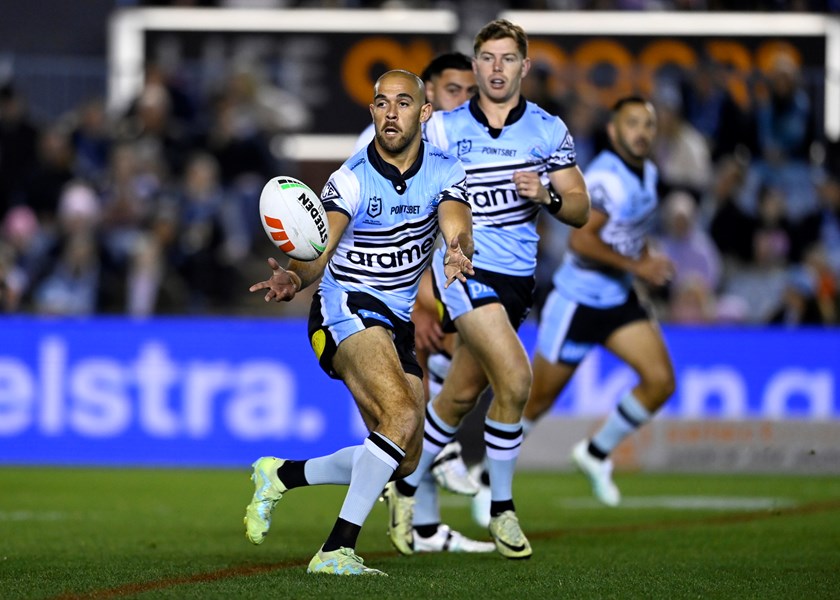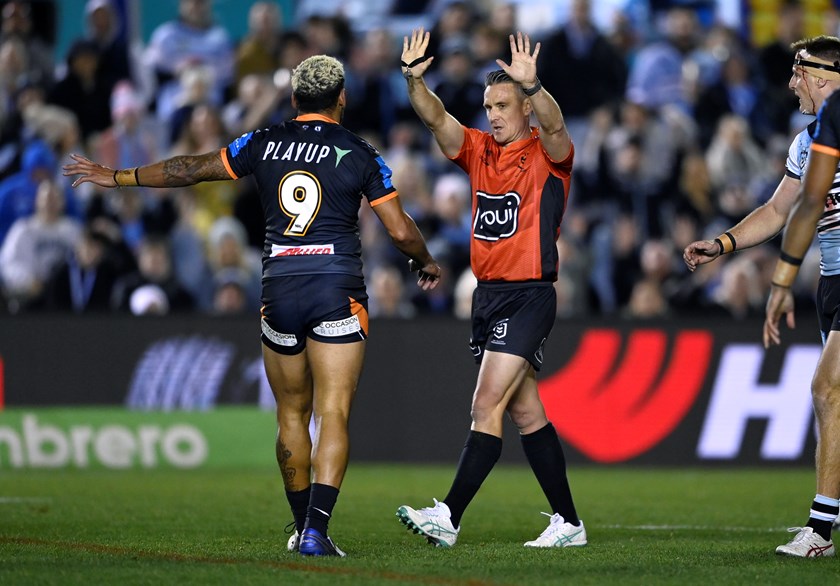NRL head of football Graham Annesley has declared the league must set an example for park footy competitions across the country as he vowed to eradicate contact with referees.
The comments come after Will Kennedy pleaded guilty to a Grade Two Contrary Conduct charge for running into referee Adam Gee in Cronulla’s win over the Wests Tigers on Friday night.
The Sharks fullback will serve a one-game suspension for the incident and Annesley hopes it sends a message that contact with referees is unacceptable.
“The only person who can see this collision is about to take place is Will Kennedy,” Annesley said at his weekly football briefing. “I am not saying he meant it, but he is the one who is looking forward, as opposed to the referee who is not looking at it at all.
“Regardless of if he is in the way or not. The referee has to be somewhere on the field, and they have to be protected. We can’t allow a situation where the referee is in the way, so [a player thinks] ‘I am going to move him out of the way’.
“We can never get to that. The ramifications of that, not just at NRL level … anyone with an axe to grind in a local park, somewhere under the control of the commission. It’s not very hard to get yourself into a position where you can have the referee between you and the ball or a defender and the next thing you know is there is a collision, and ‘oh sorry it was an accident’. We can never get to that stage.”
Kennedy’s punishment has divided opinions across the rugby league landscape after the incident occurred at high speed on Friday.
The fullback was in pursuit of teammate Kayal Iro as he ran down the field, with Gee attempting to position himself to avoid interfering in the play.
Kennedy, however, failed to adjust his line in time and ran directly into the referee’s back in a heavy collision.

The force of the contact played a key role in the severity of the charge and was compared to an incident earlier in the year when Melbourne Storm halfback Jahrome Hughes pushed a referee and was also hit with a Grade Two charge.
While acknowledging Kennedy’s contact was accidental and happened at high speed, Annesley said the onus is on players to avoid contact with match officials.
“The only people who can avoid those collisions are the two players, because the referees don’t even know they’re there,” he said. “There has to be some responsibility on them, to say ‘there is going to be a collision, I have to avoid it’.
“Players are pretty light footed, they can step off either foot to go through a gap. Why can’t they step off either foot to avoid a collision. Maybe he doesn’t [see him] but we can’t allow a situation where we say it is acceptable.
“The implications of it are widespread. The NRL sets the agenda on these things. People look to the NRL to say what is acceptable and not acceptable. Right across parks [in Australia and NZ] they would say ‘you don’t get in trouble for hitting the referee in the NRL, why am I getting charged for hitting a referee in the local park’?”
The Kennedy charge wasn’t the only controversial decision to come out of Cronulla’s victory over the Wests Tigers, with Api Koroisau sent to the sin bin midway through the first half.
The skipper jumped out at marker to slap down at Ronaldo Mulitalo’s arms, killing the Sharks’ attacking opportunity in an instant.
NRL Match Review Committee – Round 19
There was much conjecture about whether Koroisau was square at marker however Annesley said the angles available clearly showed he was not.
Even if he was, he reiterated that markers are not allowed to slap down at a dummy half’s arms or the ball itself.

“The rule says ‘markers who are onside cannot reach around to play at the ball or the arm of the dummy half’,” Annesley said.
“The referee felt he wasn’t square and interfered with the dummy half causing him to drop the ball. Even if you don’t accept that, based on that rule, it would still have been a deliberate attempt to break down the play and a sin-binnable offence.”

